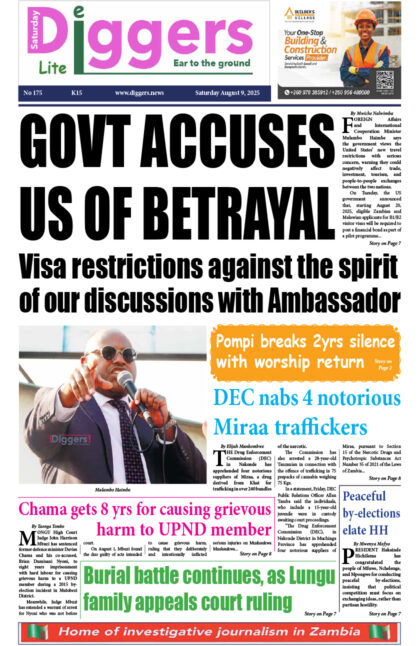VETERAN politician Vernon Mwaanga has observed that democracy in Africa has been declining at an alarming rate because of non-commitment to mechanisms and instruments of peace.
In a write up Thursday, Mwaanga noted that the commitment of member states to well- intended instruments of peace had been waning and almost forgotten.
He added that their commitment to democratic values and governance, observance of human rights and constitutionalism had been declining and continued to shrink at an alarming rate
“At the founding of the Organisation of African Unity (OAU) in Addis Ababa, Ethiopia, in 1963, they made a number of important commitments, among them; (a) to accept colonial territorial boundaries- unsatisfactory as they were. They rightly feared that any reopening of boundary discussions would lead to conflicts and even wars between African countries and create instability. (b They committed themselves to liberate every inch of Africa from the yoke of colonialism and apartheid. (c) They agreed to establish democratic governments, which would be based on the will of their people. (d) They agreed to promote trade and economic co-operation among African countries. (e) They agreed to work towards creating a strong and united Africa. This list of what our fathers agreed to do is by no means exhaustive. As more countries attained independence, we saw an avalanche of military coups which started in West Africa and spread to other parts of the continent. The first coup in Nigeria in January, 1966 found me in Lagos, just after seeing off President Kenneth Kaunda – who had been attending a Commonwealth Summit – at Lagos International Airport,” Mwaanga recalled.
“If I said that I enjoyed the experience of being caught up in a coup situation, please do not believe me. This era of military coups lasted many years and compromised the process of holding free, fair, transparent and democratic elections in Africa. Southern Africa was fortunate not to have military coups, apart from attempted coups in countries like Lesotho. The slow process of building democracy continued under different ideologies, names and concepts. One party system took root in Tanzania and Zambia, among others. In the midst of all these developments, the need arose for the establishment of a department at the Headquarters of the African Union, to deal with conflict prevention, management and resolution- which included an early warning system for monitoring possible internal and territorial conflicts. There was also a peer review mechanism put in place. Both of these mechanisms have been unmitigated failures. The commitment of member states to these well- intended instruments of peace have been waning and almost forgotten. Their commitment to democratic values and governance, observance of human rights and constitutionalism have been declining and continue to shrink at an alarming rate.”
Dr Mwaanga further said Africa had not made significant gains in democracy because of the failure to uphold values to humanity.
“What has gone wrong? The people now live in fear of their leaders, which is supposed to be the other way round. Press freedom- which is an indispensable component of the oxygen of democracy- is undergoing a slow and painful death. Elections in many countries have become a sham. Educational and health services have become ancient and non-functional. Hospitals have no medicines and the quality of education has significantly declined. Administrative staff, professors, lecturers, teachers, doctors, nurses and other health workers and government retirees are not paid, sometimes for months. Yet the leaders are living in scandalous comfort. The politicians on opposite sides don’t talk to each other. They, instead, talk at each other using the media. When there are serious problems which affect the people’s welfare, they are trivialised by showering insults on each other and hiring hooligans to attack their opponents or disrupt their meetings,” he said.
“This was not part of the script for the independence struggle. It was not about ethnicity, calling each other unprintable names, fighting and fault finding. It was about development and improving the living standards of our people and making African countries a respectable part of the global village. We must learn to live together and work together for the common good of the people of Africa. We need a new peaceful and stable environment which recognises that, [by] living side by side in peace- notwithstanding our differences- we can achieve much more. As the renowned civil rights leader, Martin Luther King Jr, put it, ‘we must learn to live together in peace as brothers and sisters, or perish together as fools’. Our attitudes toward each other must change for the better. Our supreme goals are more important than our differences. After all, democracy accommodates differences of opinion. The curse of hatred and conflict must be condemned to the dustbin of our ugly history of wars and endless conflicts. This will be the difference between war and peace.”
























